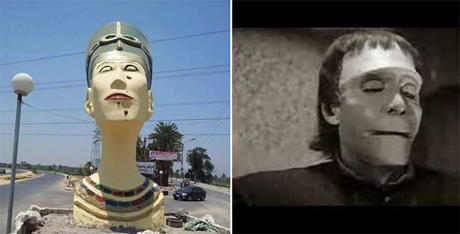CAIRO: Egyptians have mercilessly mocked an artwork labeled as “Egypt Rising” by sculptor Ahmed Abdel Naby after many on social media said it looked “distorted” and “ugly”.
The white marble statue appears to depict a woman seated, dressed in a traditional “jalabiya,” with a head cover and braided hair falling over her left shoulder.
The artwork was shared on the artist’s official page with him proudly posing next to it. But images of what he said is an unfinished piece have been trending on Twitter and Facebook as many users thought the statue did not look pretty at all.
“In the beginning, I thought this marble statue called ‘Egypt Rising’ is just a silly joke, but apparently … the scandal is real!” well-known Egyptian author Yousef Ziedan wrote on his Facebook page.
A few others were keen to support the sculptor until he finished his work before they can make up their mind.
The artist said the statue pictures were initially shared on his personal account for his friends to see, but he was surprised by the huge criticism it received.
He also apologized to his Facebook followers for what he described as an “influx of abusive comments” posted on his page over the statue’s photos.
He insisted on saying that the piece is “a personal artistic experience” and that no official authority has tasked him to construct it, Al-Masry Al-Youm newspaper reported.
Abdel Naby said his artwork depicts a woman who is trying to get out of a stone block that she is trapped in.
He defended his work saying many people did not understand the complexity of sculpting marble as opposed to other materials.
It is not the first time Egyptian sculptors have been heavily criticized on social media after unveiling their statues.
Most famous in recent years was a statue of Egyptian footballer and Liverpool star Mohamed Salah by sculptor Mai Abdallah, which was unveiled in 2018. The depiction of Salah with an enormous head and tiny limbs was heavily mocked by social media users.

In 2015, a huge bust of Queen Nefertiti was removed from public display in the Upper Egypt city of Samalout after locals compared it to Frankenstein.

A huge bust of Queen Nefertiti has been removed from the Upper Egypt of Samaloot after locals compared it to Frankenstein. (Image courtesy: Ahram Online)
In 2018, a bronze statue of Khedive Ismail Pasha, the 19th Century Ottoman ruler of Egypt and Sudan, had been clumsily painted a part of restoration work in black and white, making the once great Khedive appear more like a badly-drawn cartoon character.















